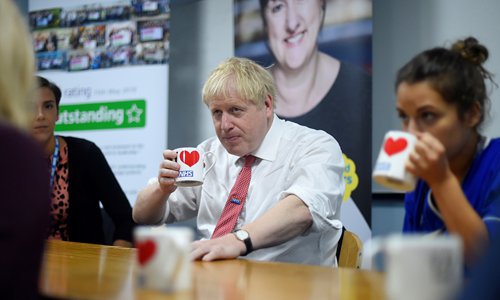HOME >> WORLD
General election can’t break Brexit deadlock
By Yuan Jinglin Source:Global Times Published: 2019/10/8 17:03:42

Britain's Prime Minister Boris Johnson speaks to mental health professionals during a visit to Watford General Hospital in Watford, north of London, on Monday. Johnson warned he will not delay Brexit beyond October 31, saying his latest proposals are a last chance to reach a deal, a Downing Street spokesman said on Sunday. Photo: AFP
On the last day before the UK parliament was prorogued, Members of Parliament voted to block a no-deal Brexit. This narrowed Prime Minister Boris Johnson's options down to leaving with a deal and asking the EU for an Article 50 extension. Though Johnson said he would "die in a ditch" before seeking an extension, the probability of a deal reached before the October 31 deadline, remains slim as ever. Hence, all corners of parliament are hoping a general election would break this deadlock.The fact is that a general election before the end of the year will not put an end to the Brexit crisis. Contra MPs' hopes, it would create more problems instead, as a likely hung parliament would leave the UK without a government for a while.
The latest polls show that a hung parliament, with the Conservatives as the largest party, is the most likely outcome of a general election. However, it would fall short of a majority, and possibly end up with fewer seats. The government would still not have a mandate in parliament, making the time and effort that went into the campaign pointless.
That does not mean a general election would bring much good news to the opposition parties either. The Conservatives are expected to win back most of the seats of the 21 MPs, who were expulsed for voting against no-deal Brexit. And the three largest opposition parties are unlikely to combine for more than the 326 seats, required for a majority. Even if they were to form a three-way coalition - unheard of in British politics - they would still need more parties on board. A tall task if they want to be in power.
To make an anti-Conservative coalition even less likely, the three parties would clash on major policies, and never agree to a coalition in the first place. The Scottish National Party's whole agenda is to make Scotland independent from the UK, something Labour and the Liberal Democrats are firmly against. While the Liberal Democrats and the Scottish National Party are pro-Remain, Labour leader Jeremy Corbyn is yet to voice his opinion on Brexit. This has raised doubts about whether he is fit to lead a pro-Remain government. Consequently, Liberal Democrats leader Jo Swinson has already announced she would not support a Corbyn-led government.
The polls also predicted a trend of votes moving away from Conservatives and Labour, the two largest parties. In the last general election, the two parties received 86 percent of votes. This number would slip to 57 percent in the upcoming one, the polls suggest. It would mean a decrease in seats for two of the largest parties. As power starts to shift away from the two major parties, passing of legislations in the parliament would become more difficult than it already was.
Let the two large parties' fall from grace be an indication of the public losing trust on them over Brexit. However fiercely they may campaign against each other in the upcoming months, neither is likely to reach a clear majority after the election. And when a new UK government is finally formed after six weeks of campaigning and exhausted MPs return from endless rounds of negotiations, they will look around the parliament, only to find nothing has changed.
RELATED ARTICLES:
Posted in: EUROPE